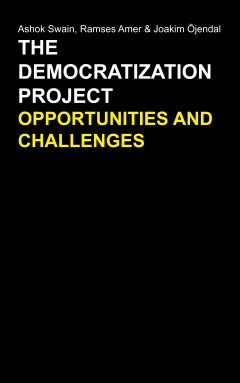The Democratization Project
Opportunities and Challenges
Edited by Ashok Swain
Ramses Amer
Joakim Öjendal
- About This Book
- Reviews
- Author Information
- Series
- Table of Contents
- Links
- Podcasts
About This Book
Democratization is a field where unexpected and sudden events have repeatedly challenged conventional wisdom. For example, who in the mid-1970s would have foreseen the democratization of Cambodia, Albania, South Africa or East Timor? Our current ‘wave’ of democratization is complex and diverse and understanding it requires a variety of theoretical approaches.
Most of the literature on democracy assumes that it is the best form of government. Theoretical works on democratic transition and democratization have also emphasized the internal conflict resolution capacity of democracy. It has been reasoned that democracy reduces the likelihood of discrimination, especially of ethno-political minorities, and thus the possibility of political repression. However, the democratic peace theory has not been explicitly tested with reference to third world post-colonial states, where most internal violent conflicts take place. Certainly, there is a dearth of practical advice for policy makers on how to design and implement democratic levers that can make internal peace and stability endure in the South.
This volume, drawing on the work of a variety of scholars, will contribute to identifying and understanding the challenges and opportunities of this ‘democratization project’ to the peace and development of the world both at the domestic level in selected countries, trends in regions of the world, and in the global system of the post-Cold War Era.
Reviews
Author Information
Ashok Swain is Professor of Peace and Conflict Research, Uppsala University and Director, Uppsala Center for Sustainable Development.
Ramses Amer is Associate Professor and Coordinator, Swedish Network of Peace, Conflict and Development Research.
Joakim Öjendal is Professor of Peace and Development Research, Gothenburg University.
Series
Anthem Studies in Peace, Conflict and Development
Table of Contents
1. The Democratization Project; 2. Non-Authorised Military Interventions and Legitimisation by the United Nations; 3. From Condemnation to Legitimisation of Outcome; 4. Demos or Deus: Patterns of Religious Dimensions in Asian Armed Conflicts, 1945-2005; 5. The Left and Democratic Consolidation - Deepening Democracy in Latin America?; 6. Democracy without People?; 7. The Role of Hamas in Building Palestinian Democracy in the Midst of Violence; 8. Elections and Violence in Sri Lanka; 9. Post-Accord Elections and Armed Conflict; 10. Peace through Democracy?: The Challenges of Post-war Democratisation in Weak and War-torn States
Links
Stay Updated
Information
Latest Tweets



